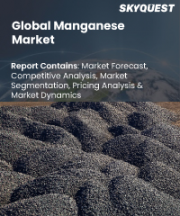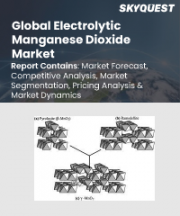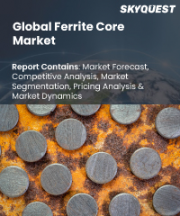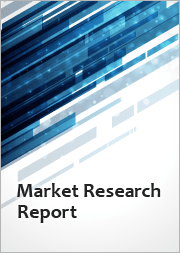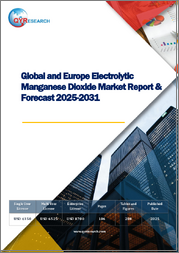
|
시장보고서
상품코드
1679228
페로망간 시장 예측(-2030년) : 등급, 제조 프로세스, 용도, 최종사용자, 지역별 세계 분석Ferro Manganese Market Forecasts to 2030 - Global Analysis By Grade (High Carbon FeMn, Medium Carbon FeMn and Low Carbon FeMn), Production Process, Application, End User and By Geography |
||||||
Stratistics MRC에 따르면 세계의 페로망간 시장은 2024년에 163억 달러를 차지하며 예측 기간 중 CAGR은 6.1%로 성장하며, 2030년에는 232억 달러에 달할 것으로 예상되고 있습니다.
망간 농도가 높은 철망간 합금을 페로망간(FeMn)이라고 합니다. 용광로 또는 전기 아크로에서 탄소원과 망간광석을 사용하여 탄소 열 환원에 의해 만들어집니다. 황 함량을 낮추고 제강에서 강도, 경도, 내마모성을 향상시킵니다. 다양한 산업 용도로 인해 페로망간은 고탄소, 중탄소, 저탄소 등급으로 분류됩니다.
세계철강협회에 따르면 2020년 세계 철강 생산량은 18억 6,400만 톤에 달합니다.
철강 생산량 증가
건설, 자동차, 인프라 부문의 철강 수요 증가는 페로망간 시장을 크게 견인하고 있습니다. 페로망간은 철강의 강도, 내구성, 내식성을 높이는 필수 합금 원소로서 철강 생산에 필수적인 요소입니다. 신흥 경제국을 중심으로 세계 인프라 개발이 가속화됨에 따라 이에 비례하여 고품질 철강재에 대한 수요도 증가하고 있습니다. 자동차 산업의 성장, 특히 특수강 합금을 필요로 하는 전기자동차의 등장은 이러한 수요를 더욱 증폭시키고 있습니다. 또한 고강도 강합금을 필요로 하는 대중교통, 교량, 고층 빌딩에 대한 정부 투자는 시장 성장에 크게 기여하고 있습니다.
원자재 가격 변동
망간광석 가격 변동은 페로망간 시장에 큰 도전이 되고 있으며, 생산 비용과 수익성에 영향을 미치고 있습니다. 이러한 가격 변동은 수요 및 공급의 불균형, 지정학적 동향, 채굴 규정의 변화로 인해 발생하며, 제조업체의 비용 관리를 어렵게 만듭니다. 광산 폐쇄, 운송 중단, 지정학적 긴장으로 인한 공급의 불확실성은 생산 설비로의 망간 광석의 안정적인 흐름을 방해하여 생산 지연 및 비용 초과로 이어질 수 있습니다. 원자재 비용의 예측 불가능한 특성으로 인해 생산자는 가격 전략을 지속적으로 모니터링하고 조정해야 하며, 이는 계획 수립을 어렵게 하고 시장 확대에 방해가 될 수 있습니다.
재활용 증가
망간철 산업은 원료 활용을 최적화하기 위한 재활용 및 폐기물 감소 전략에 점점 더 중점을 두고 있으며, 이는 큰 시장 기회를 가져다주고 있습니다. 페로망간 슬래그 및 잔류물 재활용에 대한 노력이 강화되어 폐기물을 줄이고 지속가능성을 향상시키고 있습니다. 기업은 철강 생산 제품별로 귀중한 원소를 회수하는 혁신적인 방법을 모색하고 있으며, 환경에 미치는 영향을 줄이면서 추가적인 수입원을 창출하고 있습니다. 이러한 순환 경제 원칙으로의 전환은 전 세계에서 증가하는 환경 규제와 지속가능성에 대한 압박과 일치합니다. 효율적인 재활용 기술을 개발함으로써 제조업체는 1차 자원에 대한 의존도를 줄이고, 공급망의 취약성을 완화하며, 비용 효율성을 개선할 수 있습니다.
에너지 비용 상승
에너지 비용의 상승은 페로망간 시장에 큰 위협이 되고 있으며, 특히 생산 경제와 시장 경쟁에 영향을 미치고 있습니다. 철망간 생산은 본질적으로 에너지 집약적이며, 제련에 필요한 고온을 유지하기 위해 많은 양의 전력이 필요합니다. 유럽 트레이더들은 특히 에너지 가격 상승을 우려하고 있으며, 이는 이 지역의 철강 및 합금철 생산자 모두에게 악영향을 미치고 있습니다. 유럽철강협회(Eurofer)는 에너지 비용 상승으로 인한 경쟁력 부족으로 인해 이 지역의 철강 및 제조 산업이 돌이킬 수 없는 쇠퇴를 겪을 수 있다고 경고했습니다. 에너지 시장의 변동성은 운영 비용에 불확실성을 가져와 이익률을 낮추고 생산 능력에 대한 신규 투자를 억제할 수 있습니다.
COVID-19의 영향:
COVID-19 팬데믹은 초기에 공급망 중단과 제조 중단을 통해 망간철 시장을 혼란에 빠뜨렸습니다. 유럽 공급업체들은 이탈리아 북부의 철강 공장 폐쇄 우려로 인해 초기에는 비축을 실시했다고 보고했으나, 하류 철강 수요가 급격히 감소함에 따라 이러한 추세는 수명이 짧았습니다. 세계철강협회에 따르면 2020년 세계 철강 수요는 약 2.4% 감소했습니다. 그러나 각 산업이 새로운 운영 프로토콜에 적응하고, 세계 제조 활동이 재개되고, 경기 회복을 촉진하기 위한 인프라 투자가 증가함에 따라 회복이 시작되면서 시장은 회복력을 보여주었습니다.
고탄소 FeMn 부문은 예측 기간 중 가장 큰 부문이 될 것으로 예상됩니다.
6-8%의 탄소와 70-80%의 망간을 함유한 고탄소 FeMn은 주로 제강 공정에서 탈산제 및 탈황제로 사용되며, 비용 효율성과 철강 생산에 광범위하게 사용되므로 예측 기간 중 가장 큰 시장 점유율을 차지할 것으로 예상됩니다. 이 부문의 성장은 전 세계, 특히 신흥 국가가의 인프라 개발 및 건설 활동의 확대에 힘입어 HC FeMn은 세계 최대 철강 생산 부문인 탄소강 제조에 선호되고 있습니다. 철강의 강도, 경도, 내마모성을 향상시키는 동시에 중탄소 및 저탄소 대체재보다 경제성이 우수하여 예측 기간 중 시장을 주도할 것으로 예상됩니다.
전기 아크로(EAF) 공정 부문은 예측 기간 중 가장 높은 CAGR을 보일 것으로 예상됩니다.
예측 기간 중 전기 아크로(EAF) 공정 부문은 보다 지속가능하고 효율적인 페로망간 생산을 위한 채택 증가로 인해 가장 높은 성장률을 보일 것으로 예상되며, EAF 기술은 기존 방식에 비해 탄소 배출량 감소, 에너지 효율성 향상, 생산 유연성 향상 등 큰 이점을 제공합니다. 큰 이점을 제공합니다. EAF 공정은 합금 원소를 더 잘 제어하고 재활용 재료를 더 효과적으로 사용할 수 있으므로 순환 경제 구상을 지원할 수 있으며, 이는 확대되는 환경 규제와 업계의 지속가능성 목표에 부합합니다. 또한 자동화 및 스마트 모니터링 기능을 포함한 EAF 시스템의 기술 발전으로 운영 효율성과 제품 품질이 향상되고 있습니다.
가장 큰 점유율을 가진 지역:
예측 기간 중 아시아태평양이 가장 큰 시장 점유율을 차지할 것으로 예상됩니다. 이러한 우위는 중국, 인도, 동남아시아 국가들의 급속한 산업화, 제조 능력 확대, 고성능 소재에 대한 투자 증가에 기인합니다. 중국은 세계 최대 철강 생산 및 소비국으로서 선두를 달리고 있습니다. 아시아태평양의 인프라 개발 및 도시화가 진행되면서 철강 제품에 대한 수요가 크게 증가하여 중요한 합금제로서 페로망간의 필요성이 직접적으로 증가하고 있습니다. 국내 제조 능력을 향상시키기 위한 정부의 구상은 이러한 성장을 더욱 촉진하고 있으며, 아시아태평양은 세계 철-망간 시장의 확실한 리더로 자리매김하고 있습니다.
CAGR이 가장 높은 지역:
예측 기간 중 아시아태평양은 가장 높은 CAGR을 보일 것으로 예상됩니다. 이 지역은 자동차, 전자 및 포장 산업이 호황을 누리고 있으며, 페로망간 강화 제품에 대한 큰 수요를 창출하고 있기 때문입니다. 인도와 같은 국가들이 특히 강세를 보이고 있습니다. 이 지역의 대규모 생산 기지는 낮은 생산 비용으로 인해 이 지역의 제조업체들에게 경쟁 우위를 가져다주고 있습니다. 또한 지속가능한 개발과 기술 혁신을 지원하는 정부의 구상은 시장 확대를 더욱 가속화하고 있습니다.
무료 커스터마이징 서비스:
이 보고서를 구독하는 고객은 다음과 같은 무료 맞춤화 옵션 중 하나를 이용할 수 있습니다.
- 기업소개
- 추가 시장 기업의 종합 프로파일링(최대 3사)
- 주요 기업의 SWOT 분석(최대 3사)
- 지역 세분화
- 고객의 관심에 따른 주요 국가별 시장 추정, 예측, CAGR(주: 타당성 확인에 따라 다름)
- 경쟁사 벤치마킹
- 제품 포트폴리오, 지역적 입지, 전략적 제휴에 기반한 주요 기업의 벤치마킹
목차
제1장 개요
제2장 서문
- 개요
- 이해관계자
- 조사 범위
- 조사 방법
- 데이터 마이닝
- 데이터 분석
- 데이터 검증
- 조사 어프로치
- 조사 정보원
- 1차 조사 정보원
- 2차 조사 정보원
- 전제조건
제3장 시장 동향 분석
- 촉진요인
- 억제요인
- 기회
- 위협
- 용도 분석
- 최종사용자 분석
- 신흥 시장
- COVID-19의 영향
제4장 Porter's Five Forces 분석
- 공급 기업의 교섭력
- 바이어의 교섭력
- 대체품의 위협
- 신규 진출업체의 위협
- 경쟁 기업 간 경쟁 관계
제5장 세계의 페로망간 시장 : 등급별
- 고탄소 FeMn
- 중탄소 FeMn
- 저탄소 FeMn
제6장 세계의 페로망간 시장 : 제조 프로세스별
- 전기 아크로(EAF) 프로세스
- 서브머지 아크로(SAF) 배리에이션
- 기타 EAF 프로세스 배리에이션
- 용광로 프로세스
제7장 세계의 페로망간 시장 : 용도별
- 강재 용도
- 탄소강 생산
- 스테인리스강 생산
- 합금강 생산
- 고강도 저합금망(HSLA)
- 공구강
- 용접 용도(철강 관련)
- 비철금속 용도
- 주조 용도
- 화학 산업(망간 화합물)
제8장 세계의 페로망간 시장 : 최종사용자별
- 건설과 인프라
- 자동차·운송
- 에너지와 발전
- 기계 및 중기
제9장 세계의 페로망간 시장 : 지역별
- 북미
- 미국
- 캐나다
- 멕시코
- 유럽
- 독일
- 영국
- 이탈리아
- 프랑스
- 스페인
- 기타 유럽
- 아시아태평양
- 일본
- 중국
- 인도
- 호주
- 뉴질랜드
- 한국
- 기타 아시아태평양
- 남미
- 아르헨티나
- 브라질
- 칠레
- 기타 남미
- 중동 및 아프리카
- 사우디아라비아
- 아랍에미리트
- 카타르
- 남아프리카공화국
- 기타 중동 및 아프리카
제10장 주요 발전
- 계약, 파트너십, 협업, 합병사업
- 인수와 합병
- 신제품 발매
- 사업 확대
- 기타 주요 전략
제11장 기업 프로파일링
- Maithan Alloys Ltd.
- Hira Ferro Alloys Ltd.
- Bharat Engineering Works
- Shyam Metalics
- Jainam Ferro Alloys(I) Limited
- BFCL(Bihar Foundry & Castings Ltd.)
- William Rowland
- Welcome Chemicals
- Chandrapur Ferro Alloy Plant(SAIL)
- Eurasian Resources Group(ERG)
- OM Holdings Ltd.
- Erdos Group
- Nippon Denko Co., Ltd.
- Tata Steel
- Gulf Ferro Alloys Company(SABAYEK)
- Ferroglobe
- Mizushima Ferroalloy Co., Ltd.
- Pertama Ferroalloys Sdn. Bhd.
According to Stratistics MRC, the Global Ferro Manganese Market is accounted for $16.3 billion in 2024 and is expected to reach $23.2 billion by 2030 growing at a CAGR of 6.1% during the forecast period. An iron-manganese alloy with a high manganese concentration is called ferro manganese (FeMn). It is made by carbothermic reduction with carbon sources and manganese ore in blast or electric arc furnaces. It lowers sulfur content and improves strength, hardness, and wear resistance in steelmaking. For a range of industrial uses, ferro manganese is categorized into high, medium and low-carbon grades.
According to the World Steel Association, the global steel production reached 1,864 million tonnes in 2020.
Market Dynamics:
Driver:
Increasing steel production
The growing demand for steel across construction, automotive, and infrastructure sectors is significantly driving the ferro manganese market. Ferro manganese is an essential alloying element that enhances steel's strength, durability, and corrosion resistance, making it indispensable in steel production. As global infrastructure development accelerates, particularly in emerging economies, the demand for high-quality steel increases proportionally. The automotive industry's growth, especially with the rise of electric vehicles requiring specialized steel alloys, further amplifies this demand. Additionally, government investments in public transportation, bridges, and high-rise buildings that require high-strength steel alloys contribute substantially to market growth.
Restraint:
Price volatility of raw materials
Manganese ore price fluctuations create significant challenges for the ferro manganese market, impacting production costs and profitability. These price variations stem from supply-demand imbalances, geopolitical developments, and changes in mining regulations, making cost management difficult for manufacturers. Supply uncertainties from mine closures, transportation disruptions, and geopolitical tensions can disrupt the steady flow of manganese ore to production facilities, leading to production delays and cost overruns. The unpredictable nature of raw material costs forces producers to constantly monitor and adapt their pricing strategies, creating planning difficulties and potentially deterring market expansion.
Opportunity:
Increased recycling
The ferro manganese industry is increasingly focusing on recycling and waste reduction strategies to optimize raw material utilization, presenting significant market opportunities. Efforts to recycle ferro manganese slag and residues are intensifying, reducing waste and enhancing sustainability. Companies are exploring innovative methods to recover valuable elements from steel production byproducts, creating additional revenue streams while reducing environmental impact. This shift toward circular economy principles aligns with growing environmental regulations and sustainability pressures worldwide. By developing efficient recycling technologies, manufacturers can reduce dependency on primary resources, mitigate supply chain vulnerabilities, and improve cost-effectiveness.
Threat:
Increasing energy costs
Rising energy costs pose a significant threat to the ferro manganese market, particularly affecting production economics and global competitiveness. Ferro manganese production is inherently energy-intensive, requiring substantial electricity to maintain the high temperatures necessary for smelting operations. European traders have been particularly concerned with escalating energy prices, which have negatively impacted both steel and ferro-alloy producers in the region. The European steel association Eurofer has warned of a potential irreversible decline in the region's steel and manufacturing sectors due to a lack of competitiveness driven partly by high energy costs. The volatility in energy markets creates uncertainty in operational costs, potentially reducing profit margins and deterring new investments in production capacity.
Covid-19 Impact:
The COVID-19 pandemic initially disrupted the ferro manganese market through supply chain interruptions and manufacturing slowdowns. European suppliers reported initial stockpiling by steel mills in Northern Italy amid lockdown fears, but this trend was short-lived as downstream steel demand rapidly declined. According to the World Steel Association, global steel demand contracted by approximately 2.4% in 2020. However, the market demonstrated resilience as industries adapted to new operational protocols, with recovery beginning as global manufacturing activities resumed and infrastructure investments increased to stimulate economic recovery.
The high carbon FeMn segment is expected to be the largest during the forecast period
The high carbon FeMn segment is expected to account for the largest market share during the forecast period due to its cost-effectiveness and widespread use in steel production. Containing 6-8% carbon and 70-80% manganese, it's primarily utilized as a deoxidizer and desulfurizer in steelmaking processes. The segment's growth is driven by expanding infrastructure development and construction activities globally, particularly in emerging economies. HC FeMn is preferred in carbon steel manufacturing, which represents the largest steel production segment worldwide. Its superior ability to improve steel's strength, hardness, and wear resistance while being more economical than medium or low carbon alternatives ensures its continued market leadership throughout the forecast period.
The electric arc furnace (EAF) process segment is expected to have the highest CAGR during the forecast period
Over the forecast period, the electric arc furnace (EAF) process segment is predicted to witness the highest growth rate due to its increasing adoption for more sustainable and efficient ferro manganese production. EAF technology offers significant advantages, including reduced carbon emissions, greater energy efficiency, and enhanced production flexibility compared to traditional methods. This aligns with growing environmental regulations and industry sustainability goals. The EAF process allows for better control of alloying elements and can more effectively utilize recycled materials, supporting circular economy initiatives. Additionally, technological advancements in EAF systems, including automation and smart monitoring capabilities, are improving operational efficiency and product quality.
Region with largest share:
During the forecast period, the Asia Pacific region is expected to hold the largest market share. This dominance is attributed to rapid industrialization, expanding manufacturing capabilities, and increasing investments in high-performance materials across China, India, and Southeast Asian countries. China is leading as the world's largest steel producer and consumer. Ongoing infrastructure development and urbanization in Asia Pacific drive substantial demand for steel products, directly increasing the need for ferro manganese as a crucial alloying agent. Government initiatives aimed at boosting domestic manufacturing capabilities further support this growth, positioning Asia Pacific as the undisputed leader in the global ferro manganese market landscape.
Region with highest CAGR:
Over the forecast period, the Asia Pacific region is anticipated to exhibit the highest CAGR driven by the region's booming automotive, electronics, and packaging industries creating substantial demand for ferro manganese-reinforced products. Countries like India are showing particularly strong momentum. The region's large manufacturing base with lower production costs provides competitive advantages for regional producers. Additionally, government initiatives supporting sustainable development and technological innovation further accelerate market expansion.
Key players in the market
Some of the key players in Ferro Manganese Market include Maithan Alloys Ltd., Hira Ferro Alloys Ltd., Bharat Engineering Works, Shyam Metalics, Jainam Ferro Alloys (I) Limited, BFCL (Bihar Foundry & Castings Ltd.), William Rowland, Welcome Chemicals, Chandrapur Ferro Alloy Plant (SAIL), Eurasian Resources Group (ERG), OM Holdings Ltd., Erdos Group, Nippon Denko Co., Ltd., Tata Steel, Gulf Ferro Alloys Company (SABAYEK), Ferroglobe, Mizushima Ferroalloy Co., Ltd. and Pertama Ferroalloys Sdn. Bhd.
Key Developments:
In December 2024, Eurasian Resources Group (ERG), a leading diversified metals and mining company with origins in Kazakhstan and a headquarters in Luxembourg, has officially launched its Bolashak chromium mine in Khromtau. The ceremony was attended by the President of the Republic of Kazakhstan Mr Kassym-Jomart Tokayev, ERG's CEO and Chairman of the Board of Managers Mr Shukhrat Ibragimov, CEO of ERG Kazakhstan Mr Serik Shakhazhanov, and managers of TNC Kazchrome JSC, which is part of ERG.
In March 2024, Shyam Metalics, a leading and fastest-growing integrated metal producing group, announces its ambitious foray into a greenfield expansion project focused on aluminium flat-rolled products. The Group intends to invest a whopping INR 450 crores in the same. The investment is aimed at capacity expansion of the group while also generate the employment of 1000 direct and in-direct jobs. It will increase manufacturing of Aluminium flat rolled products to bridge the demand & supply gap making Shyam Metalics group selfreliant for the raw materials of aluminium foil business. The plant is to be setup in Odisha.
Grades Covered:
- High Carbon FeMn
- Medium Carbon FeMn
- Low Carbon FeMn
Production Processes Covered:
- Electric Arc Furnace (EAF) Process
- Blast Furnace Process
Applications Covered:
- Steel Application
- Non-Steel Application
End Users Covered:
- Construction and Infrastructure
- Automotive and Transportation
- Energy and Power Generation
- Machinery and Heavy Equipment
Regions Covered:
- North America
- US
- Canada
- Mexico
- Europe
- Germany
- UK
- Italy
- France
- Spain
- Rest of Europe
- Asia Pacific
- Japan
- China
- India
- Australia
- New Zealand
- South Korea
- Rest of Asia Pacific
- South America
- Argentina
- Brazil
- Chile
- Rest of South America
- Middle East & Africa
- Saudi Arabia
- UAE
- Qatar
- South Africa
- Rest of Middle East & Africa
What our report offers:
- Market share assessments for the regional and country-level segments
- Strategic recommendations for the new entrants
- Covers Market data for the years 2022, 2023, 2024, 2026, and 2030
- Market Trends (Drivers, Constraints, Opportunities, Threats, Challenges, Investment Opportunities, and recommendations)
- Strategic recommendations in key business segments based on the market estimations
- Competitive landscaping mapping the key common trends
- Company profiling with detailed strategies, financials, and recent developments
- Supply chain trends mapping the latest technological advancements
Free Customization Offerings:
All the customers of this report will be entitled to receive one of the following free customization options:
- Company Profiling
- Comprehensive profiling of additional market players (up to 3)
- SWOT Analysis of key players (up to 3)
- Regional Segmentation
- Market estimations, Forecasts and CAGR of any prominent country as per the client's interest (Note: Depends on feasibility check)
- Competitive Benchmarking
- Benchmarking of key players based on product portfolio, geographical presence, and strategic alliances
Table of Contents
1 Executive Summary
2 Preface
- 2.1 Abstract
- 2.2 Stake Holders
- 2.3 Research Scope
- 2.4 Research Methodology
- 2.4.1 Data Mining
- 2.4.2 Data Analysis
- 2.4.3 Data Validation
- 2.4.4 Research Approach
- 2.5 Research Sources
- 2.5.1 Primary Research Sources
- 2.5.2 Secondary Research Sources
- 2.5.3 Assumptions
3 Market Trend Analysis
- 3.1 Introduction
- 3.2 Drivers
- 3.3 Restraints
- 3.4 Opportunities
- 3.5 Threats
- 3.6 Application Analysis
- 3.7 End User Analysis
- 3.8 Emerging Markets
- 3.9 Impact of Covid-19
4 Porters Five Force Analysis
- 4.1 Bargaining power of suppliers
- 4.2 Bargaining power of buyers
- 4.3 Threat of substitutes
- 4.4 Threat of new entrants
- 4.5 Competitive rivalry
5 Global Ferro Manganese Market, By Grade
- 5.1 Introduction
- 5.2 High Carbon FeMn
- 5.3 Medium Carbon FeMn
- 5.4 Low Carbon FeMn
6 Global Ferro Manganese Market, By Production Process
- 6.1 Introduction
- 6.2 Electric Arc Furnace (EAF) Process
- 6.2.1 Submerged Arc Furnace (SAF) Variations
- 6.2.2 Other EAF Process Variations
- 6.3 Blast Furnace Process
7 Global Ferro Manganese Market, By Application
- 7.1 Introduction
- 7.2 Steel Application
- 7.2.1 Carbon Steel Production
- 7.2.2 Stainless Steel Production
- 7.2.3 Alloy Steel Production
- 7.2.3.1 High Strength Low Alloy (HSLA) Steel
- 7.2.3.2 Tool Steel
- 7.2.4 Welding Applications (Steel Related)
- 7.3 Non-Steel Application
- 7.3.1 Foundry Applications
- 7.3.2 Chemical Industry (Manganese Compounds)
8 Global Ferro Manganese Market, By End User
- 8.1 Introduction
- 8.2 Construction and Infrastructure
- 8.3 Automotive and Transportation
- 8.4 Energy and Power Generation
- 8.5 Machinery and Heavy Equipment
9 Global Ferro Manganese Market, By Geography
- 9.1 Introduction
- 9.2 North America
- 9.2.1 US
- 9.2.2 Canada
- 9.2.3 Mexico
- 9.3 Europe
- 9.3.1 Germany
- 9.3.2 UK
- 9.3.3 Italy
- 9.3.4 France
- 9.3.5 Spain
- 9.3.6 Rest of Europe
- 9.4 Asia Pacific
- 9.4.1 Japan
- 9.4.2 China
- 9.4.3 India
- 9.4.4 Australia
- 9.4.5 New Zealand
- 9.4.6 South Korea
- 9.4.7 Rest of Asia Pacific
- 9.5 South America
- 9.5.1 Argentina
- 9.5.2 Brazil
- 9.5.3 Chile
- 9.5.4 Rest of South America
- 9.6 Middle East & Africa
- 9.6.1 Saudi Arabia
- 9.6.2 UAE
- 9.6.3 Qatar
- 9.6.4 South Africa
- 9.6.5 Rest of Middle East & Africa
10 Key Developments
- 10.1 Agreements, Partnerships, Collaborations and Joint Ventures
- 10.2 Acquisitions & Mergers
- 10.3 New Product Launch
- 10.4 Expansions
- 10.5 Other Key Strategies
11 Company Profiling
- 11.1 Maithan Alloys Ltd.
- 11.2 Hira Ferro Alloys Ltd.
- 11.3 Bharat Engineering Works
- 11.4 Shyam Metalics
- 11.5 Jainam Ferro Alloys (I) Limited
- 11.6 BFCL (Bihar Foundry & Castings Ltd.)
- 11.7 William Rowland
- 11.8 Welcome Chemicals
- 11.9 Chandrapur Ferro Alloy Plant (SAIL)
- 11.10 Eurasian Resources Group (ERG)
- 11.11 OM Holdings Ltd.
- 11.12 Erdos Group
- 11.13 Nippon Denko Co., Ltd.
- 11.14 Tata Steel
- 11.15 Gulf Ferro Alloys Company (SABAYEK)
- 11.16 Ferroglobe
- 11.17 Mizushima Ferroalloy Co., Ltd.
- 11.18 Pertama Ferroalloys Sdn. Bhd.






